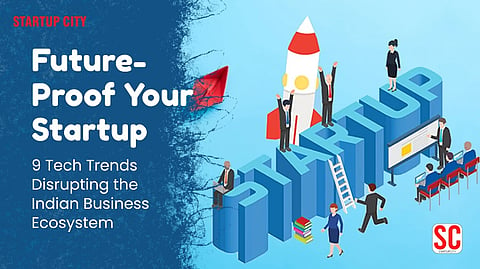

Let me ask you something:
Are you building a startup for today’s market… or tomorrow’s world?
If you're like most entrepreneurs I’ve worked with, you're juggling operations, funding, hiring, and scale. But there's one blind spot that could cost you everything—not adapting to emerging tech trends.
In today’s fast-evolving Indian business ecosystem, standing still is the fastest way to fall behind. But here's the good news—you don’t need a crystal ball to stay ahead. You just need clarity, agility, and foresight.
So, let me show you 9 powerful tech trends that are not just influencing startups—they’re disrupting the very DNA of how we build, fund, and scale businesses in India.
“AI won’t replace entrepreneurs. But entrepreneurs who use AI will replace those who don’t.”
From predictive analytics to chatbots, AI is already transforming how Indian startups handle everything from customer support to product personalization.
Bengaluru-based Yellow.ai is powering conversational AI across sectors.
AI-driven platforms like Crux Intelligence are enabling founders to access real-time insights without data teams.
Actionable Insight:
Leverage tools like ChatGPT, Midjourney, or Fireflies.ai to automate routine tasks and focus on growth.
India’s deeptech ecosystem—covering robotics, IoT, quantum computing, and advanced materials—is growing deep and wide.
According to NASSCOM, India houses over 3,000 deeptech startups as of 2024, with funding growing 53% YoY.
Imagine this: A Pune-based biotech startup uses AI-powered genomics to detect diseases before symptoms appear. That’s not the future. It’s already happening.
Startup Tip:
If you're in fintech, agritech, or healthtech—explore deeptech collaborations to drive non-linear growth.
Even as regulatory frameworks evolve, Web3 is opening up a new decentralized economy.
Think beyond crypto—NFTs, smart contracts, and decentralized apps (dApps) are helping startups:
Build trust without intermediaries
Automate payments and royalties
Offer fractional ownership to users
In my experience, startups that integrate Web3 early on are building stronger user communities and greater transparency.
Reflection Question:
Could your startup benefit from tokenized loyalty programs or smart contract automation?
India’s SaaS wave is no longer just about horizontal tools like CRM or HRMS. We’re seeing SaaS 2.0—startups building deep vertical solutions for logistics, manufacturing, healthcare, and more.
Zomentum offers revenue acceleration for IT channel partners.
FarEye is transforming logistics with predictive visibility.
Growth Hack:
Don’t chase mass appeal—own a niche. The narrower your target, the stronger your product-market fit.
Sustainability is no longer optional—it’s a business imperative.
A recent report by Bain & Company shows 75% of Indian consumers are willing to pay more for sustainable brands.
Startups are responding:
Agritech platforms like DeHaat are enabling sustainable farming.
Clean mobility startups like Euler Motors are redefining EV logistics.
Ask Yourself:
Is your startup prepared for ESG mandates, carbon credits, and eco-conscious consumers?
With rising digital adoption comes rising threats. Data leaks, ransomware, and phishing attacks are no longer rare—they’re inevitable.
Cybersecurity is now a core business function, not an IT problem.
Pro Tip:
Use Zero Trust Architecture and tools like Tenable, CrowdStrike, or Cloudflare from Day 1. Don’t wait for a breach to secure your IP and data.
Not a coder? No problem.
Tools like Bubble, Webflow, Airtable, and Zapier are empowering founders to launch MVPs in weeks—not months.
Why It Matters:
It democratizes innovation. Now, your ideas—not your tech team—drive speed to market.
Reflection Question:
How much faster could you move if you didn’t rely entirely on developers?
If you still think India’s startup magic happens only in Bengaluru or Mumbai, you’re missing the next big wave.
From D2C brands to edtech and fintech, Tier 2 and 3 cities are hotbeds of consumption, talent, and innovation.
According to RedSeer, 60% of new digital consumers now come from non-metro India.
Your Playbook:
Build multilingual platforms
Optimize for low bandwidth
Partner with regional influencers
Let’s be honest—users are bored of 2D. AR and VR aren’t just for gaming anymore.
Startups are:
Training surgeons with VR
Selling real estate via 3D tours
Onboarding users in gamified environments
Delhi-based AjnaLens is creating immersive upskilling solutions for the Indian workforce.
Ask Yourself:
Can immersive experiences reduce friction or add delight to your user journey?
Future-proofing isn’t just about tech—it’s about mindset.
The Indian startup ecosystem is one of the most vibrant in the world. But only those who embrace change early and act boldly will thrive.
“The best way to predict the future is to create it.” – Peter Drucker
So, here’s your moment.
Audit. Adapt. Accelerate.
Whether you're a first-time founder or a seasoned investor, remember this:
You don’t need to have all the answers. But you must ask better questions.
If this article sparked an idea, a doubt, or even a debate—you’re already ahead of 90% of the ecosystem.
Now, tell me:
Which of these trends will you act on in the next 30 days?
Let’s stay ahead of the curve—together.